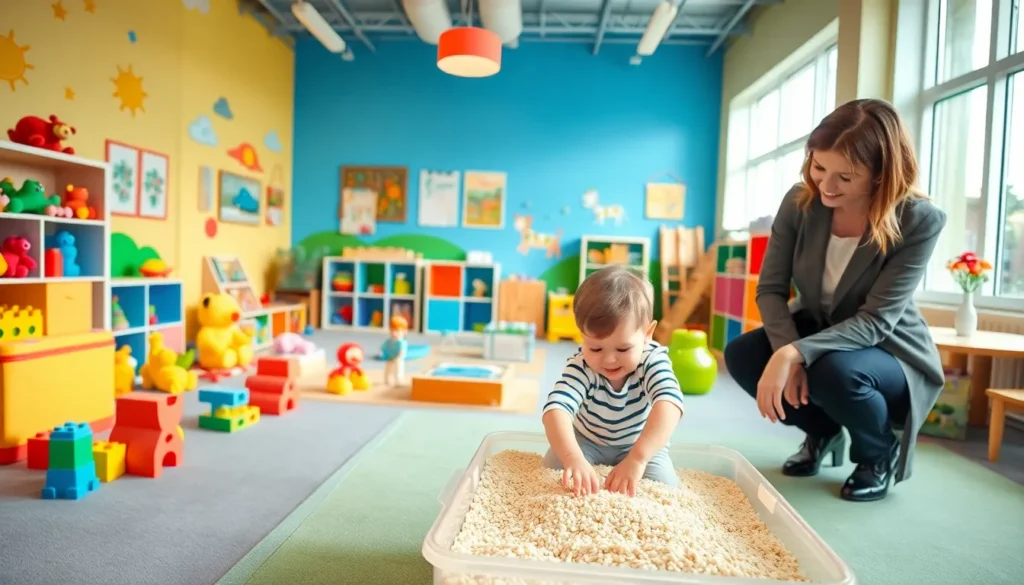Pregnancy is an incredible journey filled with anticipation and transformation. Each week brings unique changes for both the mother and the developing baby, making it essential to understand what to expect along the way. From the first fluttering kicks to the final preparations for birth, tracking these weekly milestones can help expectant parents feel more connected and informed.
As the body adapts to nurture a growing life, numerous physical and emotional shifts occur. Knowing what happens week by week not only helps in preparing for the arrival of a new family member but also fosters a sense of empowerment throughout the process. This guide will break down each week of pregnancy, highlighting key developments and offering tips for a smoother experience.
Table of Contents
ToggleOverview Of Pregnancy Week By Week
Pregnancy progresses through three trimesters, each containing distinct weekly developments. Expectant parents can track milestones that significantly affect both the mother and the baby.
First Trimester (Weeks 1-12)
The first trimester marks the beginning of major changes. By week 4, the embryo implants in the uterus. During weeks 5 to 8, the baby’s major organs begin forming. Weeks 9 to 12 show rapid growth, with the baby starting to resemble a tiny human. Symptoms such as nausea and fatigue commonly peak in this phase.
Second Trimester (Weeks 13-26)
The second trimester typically brings relief from early pregnancy symptoms. By week 16, the mother may start feeling fetal movements. Week 20 is significant as an anatomy scan usually occurs to assess growth and detect any abnormalities. Throughout weeks 21 to 26, the baby’s physical features continue to develop, and the mother may experience noticeable weight gain and a growing belly.
Third Trimester (Weeks 27-40)
The third trimester focuses on final preparations for birth. In weeks 28 to 32, the baby’s brain and lungs continue maturing. By week 36, the baby usually shifts into a head-down position in anticipation of birth. During weeks 37 to 40, the mother may face increased discomfort due to the baby’s size while preparing for labor.
Understanding these developments helps expectant parents stay informed and engaged throughout the pregnancy journey. Each week brings new changes that contribute to a deeper connection between parents and their baby.
First Trimester

The first trimester spans weeks 1 to 12 and marks crucial developmental milestones for both the mother and the baby. Significant physiological and emotional changes take place during this time.
Week 1: Understanding Fertilization
Fertilization occurs when a sperm cell meets an egg, forming a zygote. This new cell begins dividing, eventually traveling to the uterus to implant itself in the uterine lining. Accurate tracking of ovulation enhances the understanding of when fertilization might occur.
Week 2: Early Signs Of Pregnancy
Early signs of pregnancy may appear around this week. Symptoms like missed periods, breast tenderness, and fatigue often serve as initial indicators. Some women experience light spotting or mild cramping, known as implantation bleeding, which signifies successful implantation.
Week 3: Embryo Development
Within week three, the embryo begins developing fundamental structures. The neural tube, which will become the brain and spinal cord, starts forming. This stage sets the foundation for critical organ systems, highlighting the embryo’s rapid growth.
Week 4: First Ultrasound
Week four may involve the first ultrasound scan. This procedure helps confirm pregnancy viability and determine gestational age. Expectant parents often find this moment exciting, as they may see the embryo for the first time.
Week 5: Hormonal Changes
During week five, hormonal changes escalate. Human chorionic gonadotropin (hCG) levels rise significantly, supporting the pregnancy. These hormonal fluctuations often contribute to common symptoms like nausea, mood swings, and increased urination.
Week 6: Common Symptoms
Common symptoms by week six include nausea, fatigue, and frequent urination. Some women encounter changes in appetite or heightened sensitivity to certain smells. These symptoms relate directly to the body’s adaptation to pregnancy.
Week 7: Prenatal Care
Week seven often marks the initiation of prenatal care. Expecting mothers should schedule their first prenatal appointment for medical history assessments and initial screenings. Regular check-ups help ensure the pregnancy progresses healthily and safely.
Week 8: Week By Week Milestones
By week eight, the embryo develops major organs and begins moving. Mothers may hear a heartbeat during this time, marking a significant milestone. This week is vital for tracking developmental progress and addressing concerns during prenatal visits.
Week 9: Nutrition Tips
Nutrition plays a critical role in fetal development during week nine. A balanced diet rich in vitamins, minerals, and healthy fats supports the baby’s growth. Foods such as leafy greens, fruits, whole grains, and lean proteins provide essential nutrients.
Week 10: Preparing For The Second Trimester
As week ten approaches, preparing for the second trimester becomes important. Expecting parents may start researching birthing options and setting up a support system. Establishing healthy habits early encourages smoother transitions into the remaining trimesters.
Second Trimester
The second trimester spans weeks 13 to 26, marked by significant fetal growth and various physical changes for the expectant mother. Understanding each week provides insight into the development of the baby and the mother’s evolving experience.
Week 11: Fetal Development
During week 11, the fetus transitions from embryo to small baby. Organ systems continue developing, including the heart, which now beats at around 160 beats per minute. Limbs grow longer, with fingers and toes becoming distinct. The neural tube closes, ensuring a healthier brain and spinal cord.
Week 12: Gender Reveal
By week 12, some parents undergo ultrasound examinations that may reveal the baby’s gender. The sex organs begin differentiating, making it possible to detect gender visually. However, clarity can vary depending on the ultrasound’s quality and the baby’s position.
Week 13: Coping With Discomfort
Week 13 often brings relief from early pregnancy symptoms. However, new discomforts may arise, including abdominal stretching due to the growing uterus. Maintaining hydration and practicing relaxation techniques can help manage these sensations effectively.
Week 14: Exercise Recommendations
In week 14, moderate exercise becomes beneficial. Activities such as walking, swimming, and prenatal yoga support physical and emotional well-being. It’s crucial to consult a healthcare provider before starting any new exercise program to ensure safety.
Week 15: Emotional Changes
Emotions may fluctuate during week 15 as hormonal changes continue. Mood swings can occur, influenced by physical changes and anxiety about motherhood. Open communication with partners and seeking support can alleviate stress.
Week 16: Testing Options
Week 16 often includes discussions about genetic testing options. Non-invasive prenatal testing (NIPT) screens for chromosomal abnormalities with high accuracy. Parents should consult with their healthcare provider to make informed decisions about tests based on personal and family history.
Week 17: Baby’s Growth
By week 17, the fetus measures approximately 5 inches long and weighs around 5 ounces. The baby’s senses start developing, with the ability to hear sounds. Amniotic fluid acts as a protective cushion, allowing for more physical movement.
Week 18: Parenting Classes
Week 18 presents an opportunity to explore parenting classes. Many expectant parents benefit from childbirth education, breastfeeding workshops, and newborn care courses. Enrolling in classes prepares parents for the challenges and joys of caring for an infant.
Week 19: Third Trimester Preparations
During week 19, parents begin preparations for the third trimester. Creating a registry, assembling baby gear, and setting up a nursery become priorities. Engaging family and friends can support planning efforts.
Week 20: Mid-Pregnancy Evaluation
Week 20 marks a crucial mid-pregnancy evaluation. Healthcare providers conduct anatomy scans to assess the baby’s development and overall health. Parents receive information about fetal growth, organ development, and placental status during this appointment.
Third Trimester
The third trimester marks an important phase filled with preparation and final developments for both mother and baby. Expectant parents should focus on key milestones and important tasks in the weeks leading up to delivery.
Week 21: Final Stretch
Week 21 signals the onset of the final stretch of pregnancy. The fetus grows significantly, measuring about 10.5 inches long and weighing around 12 ounces. Parents often experience heightened emotional connections as physical movements become more noticeable. Preparing the nursery and discussing parenting strategies may enhance bonding during this stage.
Week 22: Pack Your Hospital Bag
By week 22, packing the hospital bag becomes essential. Items to include are cozy clothing, toiletries, and snacks. Suggested items also encompass essential paperwork, baby clothes, and supplies for post-delivery care. Organizing these items now alleviates stress closer to the due date.
Week 23: Labor Signs
Week 23 raises awareness about labor signs. Expectant parents should learn to identify symptoms such as persistent back pain, Braxton Hicks contractions, and pelvic pressure. Understanding these signs helps parents differentiate between false labor and the beginning of actual labor, ensuring timely responses.
Week 24: Preparing For Baby’s Arrival
During week 24, preparations intensify for the baby’s arrival. Parents may finalize the nursery, ensuring all essentials like diapers, clothes, and a crib are ready. Attending childbirth classes and arranging for a pediatrician can further facilitate smooth transitions once the baby arrives.
Week 25: Self-Care Tips
Week 25 emphasizes the importance of self-care. Parents should prioritize rest and relaxation to manage fatigue. Gentle exercise, such as walking or prenatal yoga, helps maintain physical well-being. Staying hydrated and following a nutritious diet supports both maternal and fetal health.
Week 26: Birth Plan Considerations
By week 26, crafting a birth plan becomes a priority. Parents should consider preferences around labor, delivery methods, pain management, and postnatal care. Discussing these elements with healthcare providers ensures alignment on individual wishes, creating a supportive environment during labor.
Week 27: Final Appointments
Week 27 often marks the scheduling of final appointments with healthcare providers. These visits assess fetal development, monitor health conditions, and discuss any concerns. Regular check-ins help maintain a clear understanding of the pregnancy progression, ensuring both parents feel supported and informed.
Navigating pregnancy week by week is a remarkable journey filled with growth and discovery. Understanding the changes that occur each week empowers expectant parents to embrace the experience fully. From the initial signs of pregnancy to the preparations for welcoming a new life, each milestone offers valuable insights and opportunities for connection.
By staying informed about the physical and emotional shifts that accompany pregnancy, parents can foster a supportive environment for themselves and their baby. This knowledge not only enhances their experience but also lays the foundation for a positive transition into parenthood. Embracing this journey with confidence makes all the difference in creating a nurturing atmosphere for the little one.




